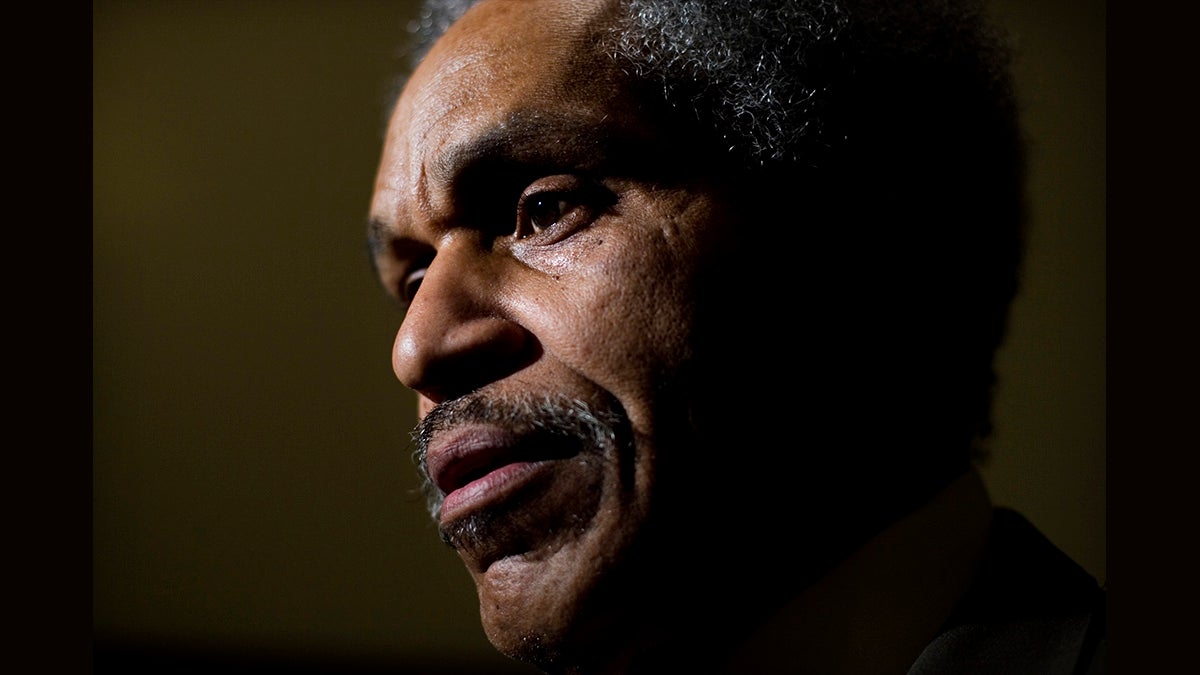Hillary Clinton must channel John Street in FBI scandal

Former Philadelphia Mayor John Street is seen at City Hall in Philadelphia. (AP Photo)
On Friday, Federal Bureau of Investigation Director James Comey wrote Congressional leaders, saying newly discovered emails could be relevant to the investigation of Democratic Presidential Nominee Hillary Clinton’s use of a private email server while Clinton was Secretary of State.
The emails were on a laptop shared by top Clinton Aide Huma Abedin and her estranged husband, Anthony Weiner, a former Congressman now under investigation for allegedly sending sexually explicit text messages to a 15-year-old girl.
Comey’s letter, sent less than two weeks before Election Day, breaks longstanding Department of Justice policies, a fact his superiors at DOJ shared with Comey before the letter’s release. Even worse, FBI agents apparently knew about the emails for weeks prior to informing Comey, and sat on them for reasons that have not yet been explained. Perhaps most importantly, the FBI got a warrant to search the emails two days after Comey’s announcement, meaning Comey went public without even knowing what the emails contain.
In the worst scenario for Hillary Clinton, the actions of the FBI Director and his agents could cost Clinton the election. However, if voters believe Comey—formerly a registered Republican—acted out of political bias, Clinton could be propelled into the White House on a wave of voter anger.
I’ve seen it happen before, in a startlingly similar scenario involving former Philadelphia Mayor John Street.
The year was 2003. Street, an incumbent Democrat, was trailing Republican challenger Sam Katz in a close race.
There were racial overtones to the contest. Katz was white. And Street, the city’s second black mayor, had stoked racial resentments in 2002 by saying in an address to an NAACP conference, “Let me tell you: The brothers and sisters are running the city. … Don’t you let nobody fool you; we are in charge of the City of Brotherly Love.”
It was a message that his largely African American audience saw as uplifting in a city where blacks had previously been marginalized. However, mainstream media saw Street’s message as divisive, and reported it as such.
Street later apologized for his remarks, but the FBI was already investigating Street’s administration. They’d spent four years trying to find evidence of a pay-to-play culture in which political favors, jobs and contracts were traded in exchange for campaign contributions.
In an attempt to trace such activity to the mayor, FBI agents planted two listening devices in Street’s office. One of the bugs was found during a security sweep just a month before Election Day. Street’s campaign painted the bug as a political ploy engineered by Republicans in Washington, and an angry black electorate rose up to sweep Street back into office.
Street was never charged with any wrongdoing in the probe, but the FBI was tarnished by the whole sordid mess.
Hillary Clinton’s campaign would be wise to look to Street’s handling of the FBI bug if it hopes to weather the final days of the presidential race.
Clinton, after all, has much in common with Street.
Just as Street was only the second black man to hold the mayor’s office in Philadelphia, Clinton is the first female to have a serious chance to become President of the United States. Street’s embrace of his blackness was an affront to some during his mayoral run. Clinton’s gender–along with her promise to protect the legacy of Barack Obama, America’s first black president–has similarly stoked some opposition to her candidacy.
But fighting this latest salvo in the battle to derail Clinton’s presidential campaign is about more than race and gender.
It is about equal treatment under the law, regardless of any differences between us, including our political affiliations.
Clinton’s opponent, Donald Trump, has garnered the support of millions of Americans by stoking the fires of division. He has said that blacks are unemployed and live in hellish inner cities where we spend our days dodging bullets. He has said that Mexican immigrants are criminals and rapists, that Muslims should be banned from entering the country, and he has bragged on tape about sexually assaulting women, only to later dismiss his own claims as “locker room talk.”
Now Clinton’s opponent is saying one more thing: That the FBI Director would not have written a letter to Congress if the newest email scandal was not serious.
Unfortunately, we don’t know if that’s true, because Comey wrote to Congress before fully reviewing the emails, and despite calls for more information from both Clinton’s campaign and members of Congress, the FBI has not released more facts.
In my view, that’s wrong.
If Hillary Clinton’s campaign does not fight this with the same ferocity that the Street campaign used in 2003, if the candidate herself does not push back with all her might, if she does not shout with every breath in her body that the FBI has run amuck, she is not only abandoning those Trump has cast aside.
She is showing us that she doesn’t deserve to be president.
WHYY is your source for fact-based, in-depth journalism and information. As a nonprofit organization, we rely on financial support from readers like you. Please give today.


